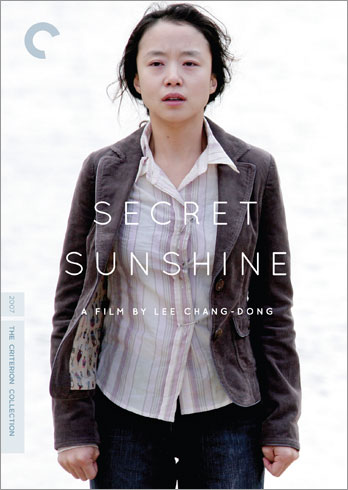
A widow and her young son move from the big city to a smaller town in the provinces. It's the place where the woman's dead husband was born, and her journey to this part of the country symbolically fulfills his wish to return to his roots. There, she will set up a school for teaching children to play the piano and start anew. It's the beginning of a new life.
And it really is just the beginning. From this very simple premise, South Korean director Lee Chang-dong cultivates Secret Sunshine, an unpredictable, rich drama about grief and loss, a narrative that isn't afraid to wander a little on its search for redemption. Jeon Do-yeon, who was honored at Cannes for her performance, plays the piano teacher, Shin-ae. The grieving woman wants to cut ties with her old life back in Seoul and establish a new existence where she and her son Jun (Seon Jung-yeob) can simultaneously come to terms with their lost loved one and honor his memory. Perhaps it's a bad omen, though, that their car breaks down just on the outskirts of their new home, especially since Jun's father died in an auto accident. Then again, maybe it's fortuitous, because this is how Shin-ae meets Jong-chan (popular actor Song Kang-ho from The Good, the Bad and the Weird [review]). Jong-chan immediately takes a liking to Shin-ae and helps her get set up. The new town is called Miryang, which translates as "secret sunshine." In other words, there is happiness here, it just might not be obvious at first.
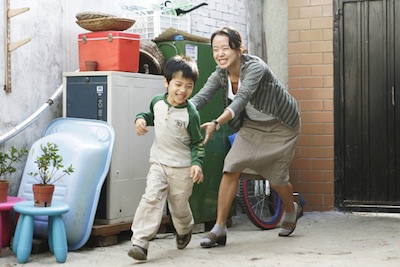
Initially, things go well for Shin-ae. Her business gets rolling, and Jun is adjusting to his new school. Some days are good (the boy playfully instigates a game of hide-and-seek with his mother), some are not so good (he cries before being sent to class), and only as Secret Sunshine progresses do we realize how portentous these small moments really are. After a night out with the girls, Shin-ae returns to the house to find Jun gone. This time it's no game, a ransom call comes shortly after. The kidnapper believes that Shin-ae is rich since she has been talking about investing in land, and so he demands all her money. She pays up, but it's not enough and her son is not returned to her. Within days, his body is found in a marsh and the killer is arrested. Her family blames Shin-ae, and she begins looking for some semblance of reason in a world that has spun out of control.
The rest of the film tracks the trajectory of her mourning. It's a twisting road marked with impermanent solutions and further disappointments. Initially, Shin-ae finds relief in Christianity and the community it offers--as someone who grew up in the Pentecostal church, I can tell you that Chang-dong's portrayal of faith and worship is disquieting in its accuracy--but even that proves inadequate after a time. Once the control the religion initially offered is nullified, Shin-ae's behavior grows increasingly erratic. The only constant is Jong-chan, who endures ridicule and heartache to stand by a woman he loves and who will have nothing to do with him romantically. Song Kang-ho is a terrific actor, and his natural demeanor immediately puts the audience on his side. He provides a bit of low-key comic relief in a movie that is otherwise pretty heavy. Jong-chan even pretends to go to church with Shin-ae, hilariously sneaking out back to steal a quick smoke.
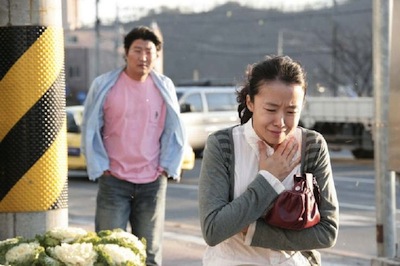
Secret Sunshine was adapted by Lee Chang-dong from a novel by Korean author Yi Chong-jun. As he did in his most recent film, Poetry, Chang-dong takes on a complex subject and engages every facet. There are swift storytelling solutions that could turn a film like Secret Sunshine into a slickly clichéd tearjerker and even more obvious ways in which this tragic tale could be turned into a feel-good crowd pleaser. Chang-dong is not concerned with either of these outcomes; rather, he is more fascinated by the spontaneity of real life and the awkward and often counterproductive choices we all make when faced with overwhelming circumstances. He and his cinematographer, Cho Yong-kyu, let Secret Sunshine play out in real locations, using naturalistic light, capturing Shin-ae's unraveling in all of its detail. Secret Sunshine is a film that establishes a semblance of realism, but that also avoids being burdened by it. Being true to life doesn't mean there isn't room for melodrama or style; rather, these things can inform one another. It's a beautiful film to look at--and particularly astonishing on Blu-Ray; the transfer is remarkable--not despite of its lack of adornment, but because Chang-dong and Yang-kyu see the beauty in everything around them. It's a subtle part of the film's message: stop and appreciate the details you might otherwise take for granted, every facet is essential.
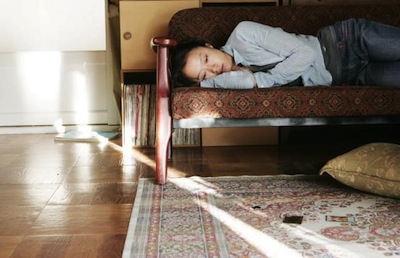
Jeon Do-yeon is indispensible in putting this across, particularly as Shin-ae's story builds and we begin to see how even the smallest event reverberates through her life. Shin-ae is a demanding role, requiring grand demonstrations of grief, but also more subtle emotions. The actress is just at home being a doting mother as she is playing the irresponsible drunk; she can play angry, anxious, and totally unhinged with equal conviction. Do-yeon's performance demands empathy from the viewer, even during the times when Shin-ae is being irrational. We can sympathize, sure, but the compulsion to understand, that's what is powerful.
Though Secret Sunshine doesn't compartmentalize its emotions or deliver its concluding peace in a tidy package, the film does reach an uplifting conclusion of sorts. The final scene is a moving one, relying on feeling rather than exposition to communicate. In some cultures, cutting one's hair is an important symbol of mourning and moving on. As a writer, I have personally used it in just about every long-form prose project I have undertaken. What Secret Sunshine demonstrates is that there is no one event or easy proverb that gets a person to a point of acceptance, it's more of a gradual process, an assembling of experiences, the sort of puzzle that doesn't make sense until certain key pieces fall into place. One minute the accumulated events look like nothing at all, the next it all becomes clear. If we haven't quite realized what has happened, the last shot of Chang-dong's movie lingers, giving us time to pause and ponder before the credits roll and we shoot out of our seats. Again, the sunshine is there, you just have to stop for a second, look, and consider its radiance.
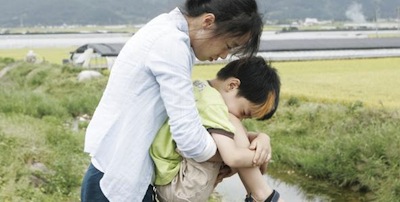
Please Note: The images used here are publicity stills, not screencaptures from the Blu-Ray.
This disc was provided by the Criterion Collection for purposes of review.

No comments:
Post a Comment